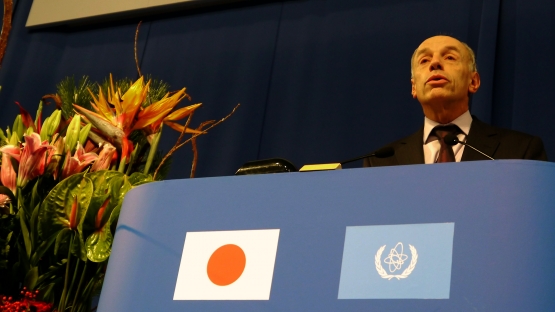Koriyama, Fukushima Prefecture, Japan -- The Fukushima Ministerial Conference on Nuclear Safety closed today with calls for continuous improvement and vigilance to further strengthen nuclear safety worldwide.
In his closing remarks, Denis Flory, the IAEA's Deputy Director General in charge of Nuclear Safety and Security, said the Conference provided an excellent opportunity to share knowledge and lessons learned from the accident at TEPCO's Fukushima Daiichi Nuclear Power Plant, to further enhance transparency and to discuss the progress of international efforts in strengthening nuclear safety, including through the implementation of the IAEA Action Plan on Nuclear Safety.
"The Conference has provided a good occasion to reconfirm commitments to nuclear safety," he said, adding that it had also provided a chance to grasp first-hand the "unbelievably complex and harsh conditions" in which workers at the plant had to react to the accident and the complexity of the ongoing work there.
The Conference, organized by Japan in Fukushima Prefecture in co-sponsorship with the IAEA, wound up with the presentation of Chairperson Summaries from the three expert Working Sessions.
"The actions of the IAEA in pursuing the Action Plan on Nuclear Safety and, in fact, this very Conference attest to the seriousness of the world nuclear community in seeking to maximize learning from the Fukushima Daiichi accident," said Mike Weightman, the UK's Chief Inspector of Nuclear Installations, who chaired the session on Lessons Learned from the Accident at TEPCO's Fukushima Nuclear Power Stations. "All of this is based on a fundamental approach to nuclear safety, namely, that of continuous improvement - no matter how high the standards, the quest for improvement must never cease."
Ramzi Jammal, Executive Vice-President and Chief Regulatory Officer at the Canadian Nuclear Safety Commission, who chaired the session on Strengthening Nuclear Safety, Including Emergency Preparedness and Response, said that although significant progress had been made, considerable work remained to be done.
"Full and effective implementation of the Action Plan requires joint efforts and full commitment from the IAEA Secretariat, Member States and other stakeholders," he said. "Strengthening nuclear safety should always be considered a work in progress."
Alumanda Dela Rosa, Director of the Philippine Nuclear Research Institute, who chaired the session on Protection of People and the Environment from Ionizing Radiation, also stressed the need for continued action.
"It is important for all those involved - whether nuclear regulators, plant operators, governments or international organizations - to maintain the momentum gained in the 15 months since the adoption of the Action Plan in the collective drive to improve nuclear safety in the area of protection of people and the environment around the world," she said.
Some 117 countries and 13 international organizations attended the Conference, which aimed to share knowledge and lessons from the Fukushima Daiichi accident, further enhance transparency and discuss the progress of international efforts to strengthen nuclear safety. Forty-six of these attended at the level of minister or equivalent high rank, or head of organization.


